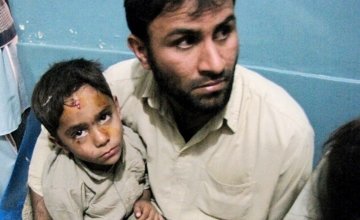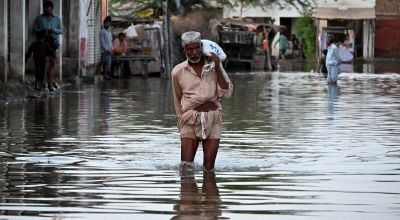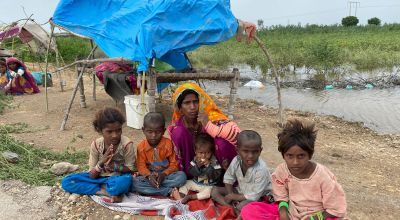
Read our 2024 annual report

Knowledge Hub
Afghanistan earthquake: my experience

Concern’s country director in Afghanistan, Janardhan Rao, describes this week’s earthquake and assesses the risks ahead for those affected by it.
I could feel the ground shaking as I ran out of the office.
Wisdom says that when an earthquake strikes, you should stay where you are and find safety in a doorway or under a table. But in reality, when the earth sways violently beneath you, wisdom is forgotten and instinct propels you outside as fast as your legs can carry you. My overriding fear was that the building would collapse and I would still be in it.
There were just a few other members of staff in our Kabul office – we all gathered in the courtyard and watched helplessly as the office building shook, trees and electric pylons and cables swaying violently around it. Around the neighbourhood outside the office, we could hear great commotion; people were gathered in panicked swarms, shouting for friends and colleagues. We quickly tried to call our offices in the field and we simply could not get through as all phone lines were dead.
Then we started to hear the news of what was happening around the country.
School stampede
Twelve school girls were killed when the powerful quake hit the north of the country on Monday. These girls were not killed by falling debris or collapsing walls, but by a panic-fuelled stampede in their school in which they were crushed as they tried to exit the building. This is particularly devastating in a country where Concern has been actively trying to encourage girls to attend school and to get a valuable education.
Earthquake in Pakistan
In neighbouring Pakistan, at least 200 people have died and more than 1,000 people have been injured. Pakistan is highly vulnerable to natural disasters because of its climate and geography. Having a team of experts on hand who are trained to work effectively in emergency situations is critical to our work in the country. We regularly train staff in emergency response to ensure that we maintain the quality of our work in difficult situations.
Earthquake hotspot
Although the north of Afghanistan is prone to earthquakes due to its position on a seismic hotspot, quakes are typically mild and do not cause much damage. In fact, way back in 1998 we entered Afghanistan in response to an earthquake that shook Takhar province resulting in hundreds of deaths and huge destruction.
The earthquake that hit the country this week was a different beast altogether, scoring 7.5 on the Richter scale. Our only saving grace was the depth of the quake – travelling some 132 miles underground, it seems to have spared the lives of many. As things stand, casualty numbers are thankfully quite low. It looks like structural damage will however take years to repair.
Now, in the immediate aftermath of the disaster, we must discover the extent of the damage and identify who needs help.
A double blow
The real challenge in assessing the scale of the damage is the terrain. Northern Afghanistan is tremendously mountainous, which is both a blessing and a curse. The mountain ranges make for spectacular and dramatic landscapes, with their shadowy slopes and snowy peaks.
However, the mountains also make access to remote villages very difficult. The infrastructure in the region is poor, and landslides have now blocked off a number of roads. The region has been affected by conflict for years, making access harder still.
Beleaguered by war and now hit by this huge earthquake, the people of Afghanistan have been dealt a double blow.
Our local team here and the people we work with are incredibly resilient, even when faced with the most difficult of circumstances.
Concern has been working in Afghanistan since 1998 and has responded to a series of emergencies in the country. Since Monday we have been scouring the region, seeking out the poorest and most vulnerable, who need our help in the wake of this disaster
Dangers of winter
I am conscious that winter is fast approaching. This makes the needs more urgent still. Afghanistan gets notoriously cold in the depths of winter, with blankets of snow and sheets of ice.
The night temperatures have already dropped down to below zero and I remember even in early November last year sitting out. For those whose houses have been destroyed or damaged in this earthquake, they face a long winter with no proper shelter or protection from the elements.
Right now, what is needed is food, warm clothes and heating such as firewood, sawdust, whatever they can lay their hands on to keep the family warm.
In terms of shelter, we have prepositioned some tents, but these are not an answer to the severe winter
We may need to discuss possibilities of rental support so that the families who have lost shelter could move out and find places where they can stay. Some of these solutions are straightforward, but the shelter one is not.
Before the temperatures plummet, it is vital that Concern and other agencies work quickly and efficiently to assess the damage and help those who need it most.
Donate now
Help us to reach those affected by the earthquake in Afghanistan and Pakistan. Donate today.





